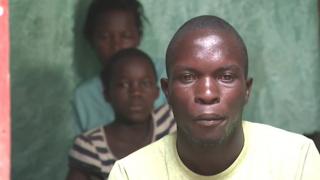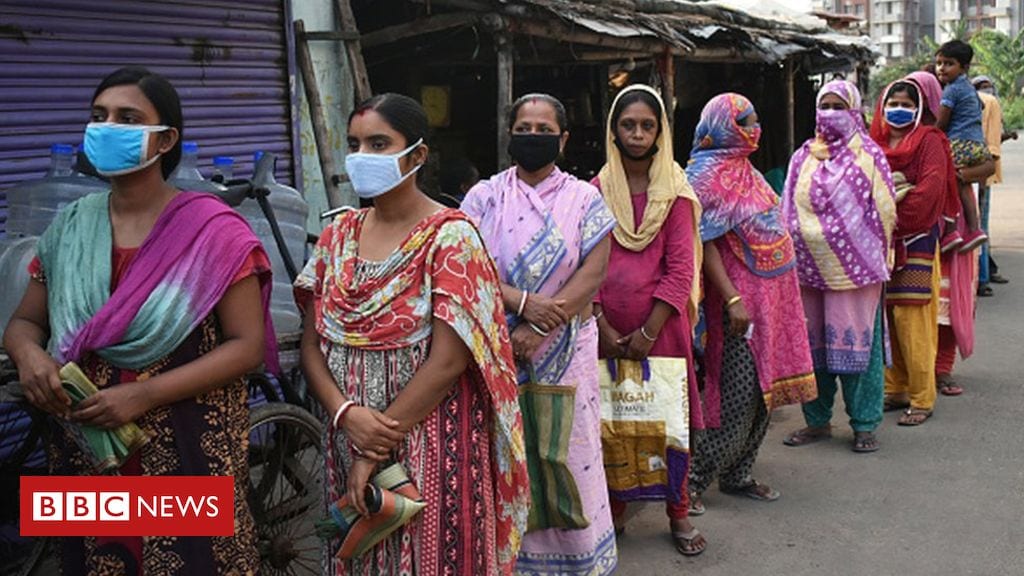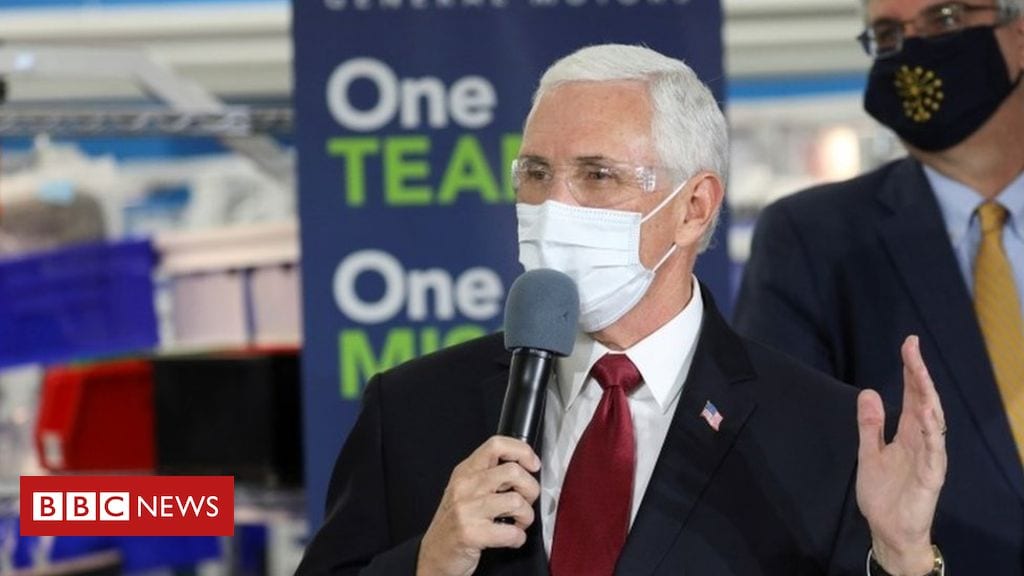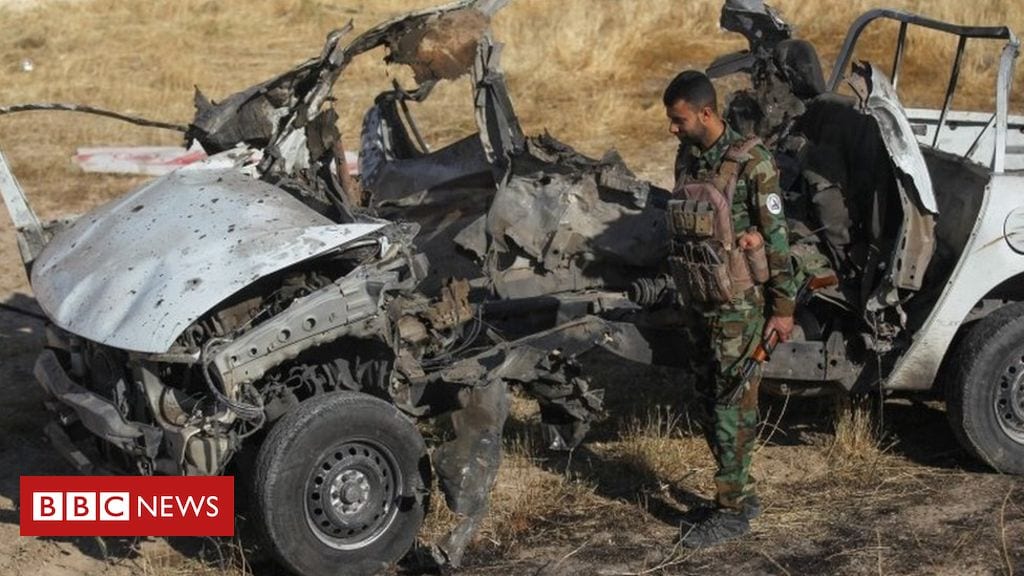[ad_1]

Stuck at home because of the lockdown, 25-year-old Ugandan Richard Kabanda is worried about feeding his family.
The motorbike taxi driver, who used to earn about $2 (£1.60) a day, has had no work since the government banned public transport last month as part of measures to slow the spread of coronavirus.
“We are going to die because there is nothing we can do,” he told the BBC from his house, which is in a slum, close to the swamps by Lake Victoria.
“We are going to die inside our homes because we will run out of food yet we’ve been told not to leave our homes.”
How to balance lives with livelihoods
Once his savings had run out, he had hoped to benefit from a food distribution programme that the government promised to 1.5 million of those most in need.
His experience was typical of the more than four out of five African workers who survive day-to-day in the informal sector and have no access to state assistance.
African governments, including Uganda’s, are now facing a policy conundrum.
Image copyright
AFP
Stall holders in Uganda’s capital, Kampala, were asked to sleep with their produce during the lockdown to prevent them moving around
Many acted swiftly with lockdowns or restrictions on movement as the spectre of coronavirus approached the continent. But the authorities are also aware of the toll these measures are taking on their citizens.
They are now grappling with how to move into the next phase of how to contain the virus and restart the economy.
“Getting the balance right between people’s lives and livelihoods is the big trick for poorer countries,” said Ronak Gopaldas, director of the South Africa-based risk management company, Signal Risk.
“If people don’t work, they don’t eat. Ongoing lockdowns are unsustainable in their current forms.”
Image copyright
Reuters
People in the informal sector make up more the 80% of the workforce across the continent
Few African countries have social safety nets to catch people if they lose their jobs.
The precarious existence for those workers in the informal sector, and the large numbers of relatives who rely on them, means that the halting of economic activity could spell disaster.
So what are African governments doing to cushion their citizens from the impact of unemployment?
Looking at sub-Saharan Africa as a whole, the World Bank has predicted that the region could fall into a recession in 2020 for the first time in 25 years as a consequence of the coronavirus outbreak.
Nigeria, South Africa and Angola are likely to be hit hardest, but all countries will see a slow down.
Impact of coronavirus on GDP
Comparing 2020 forecasts
Governments and central banks have come up with a series of macro-economic measures, including tax relief and interest rate reductions, to try to avoid the worst effects.
While those may mean that some keep jobs that would otherwise have been lost, it is the help that governments can give to directly to the people that may be more significant in the short-term.
Is South Africa’s big plan working?
South Africa, with the continent’s most industrialised economy, has announced the biggest action plan so far.
Last week, President Cyril Ramaphosa outlined a comprehensive $26bn (£21bn) economic package, amounting to 10% of the country’s GDP, to help boost the economy.
AFP
Some of the measures governments have introduced
-
Nigeria$1.4bn fiscal stimulus, extend cash transfers for poorest
-
Kenyatax relief and reductions, new cash-transfer scheme
-
UgandaBoosted lending capacity of development bank, food handouts
-
South Africa$26bn economic package, new cash-transfer scheme
Source: IMF
He said that this would be “equal to the scale of the disruption [coronavirus] is causing”.
Jane Barrett, who works in South Africa for Wiego, an organisation that supports women in informal employment, says that things are currently “pretty dire on the ground”.
People are relying on food parcels that are being distributed by charities and civil society organisations but “we are hearing heart-breaking stories all the time of people not being reached in rural areas and whole informal settlements where food distribution has hardly touched”, she adds.
Image copyright
Reuters
In South Africa, charities have been distributing food to those most in need
About $2.6bn of the money the government is spending will be given in the form of cash transfers to those most in need.
People who are already receiving child benefit, currently $23 per child per month, will get an extra $16 per child next month and potentially more money after that.
This should help 18 million South Africans – just under a third of the population.
State pensions will also be boosted and those who are not receiving either of these benefits, or unemployment insurance, could qualify for a new payment of $18 a month for the next six months.
This is not an insignificant amount, Ms Barrett says, “but I’m not sure that it’s going to be sufficient to alleviate the terrible hunger that we are seeing”.
You may also be interested in:
Some of the money to pay for the whole economic package will not come from loans or new taxation but will be the result of a reorganisation of spending priorities and drawing on a surplus in the unemployment fund.
But South Africa will still need to borrow more to pay for these commitments.
Other countries on the continent may find this harder as they could be reluctant to incur more debt repayment costs, says Razia Khan, chief economist for Africa at Standard Chartered Bank.
While donors have announced a freeze on repayments for now, this will not last forever.
“Given the greater formalisation of South Africa’s economy it is able to come up with its package,” she adds.
“But this is the difficulty for many countries – it is incredibly hard for governments across the region to reach out to those who operate in the informal sector. This is a key hurdle.”
Kenya’s ‘pro-poor’ approach
Kenya’s government has used an existing cash transfer programme, Inua Jamii, to boost payments to more than one million vulnerable people, who are either elderly, disabled or orphaned.
Image copyright
Reuters
Some people are able to carry on working despite measures to prevent the spread of the virus
But there will still be many others among Kenya’s 51 million people who will need help.
In announcing a new scheme, known as the Covid-19 Support Stipend, President Uhuru Kenyatta said his government was adopting a “pro-poor approach… knowing that they are disproportionately affected” by the pandemic.
It has earmarked $93m for the fund that will target squatters, street hawkers, food vendors, motorbike taxi drivers and other labourers who have lost their jobs with weekly payments.
But how many, and exactly who, will qualify is not yet clear as the authorities need to establish the infrastructure to identify those most in need.
And $93m does not sound much compared to the $2.6bn in South Africa.
A pilot project in Kibera, a slum area of the capital, Nairobi, in which recipients got a one-off payment of $19, was deemed successful by the authorities.
“This is a huge step in the right direction,” Rachel Strohm, a researcher into poverty alleviation policies, told the BBC, as “cash transfers are a well-proven means of supporting vulnerable people during times of crisis”.
But she highlighted the lack of clarity over the recipients. If it is to be distributed among all 18.6 million Kenyans who live below the poverty line of $2 a day, it would not last long.
So what is being done in Uganda?
This kind of cash transfer scheme does not appear to have been adopted by Kenya’s neighbours.
For example, both Rwanda and Uganda are for the moment relying on using food handouts to sustain the most needy.
But in Uganda, they may not be reaching everyone who is hungry. The Ugandan motorbike taxi driver, Mr Kabanda, said that he had not yet received a food parcel a fortnight after the food scheme was announced.
Disaster Preparedness Minister Musa Ecweru told the BBC that the government had so far reached half a million people who had no income.
He added that it had been challenging to find the recipients as social distancing rules mean that the authorities have to make deliveries door-to-door in slums that have no proper addresses.
And what about Nigeria?
Nigeria, Africa’s most populous country with some 200 million people, has ordered a lockdown in its commercial hub, Lagos, the neighbouring state of Ogun and the capital Abuja.
A trader who sells car parts in Lagos’ Ladipo market, thought to be the largest motor spares market in the region, told the BBC that he was suffering.
“Some of us have not opened our shops for three weeks now and that’s how we get money for food,” he said.
Image copyright
Reuters
Kenyan artists have graffitied a wall in one area of the capital, Nairobi, to remind people of ways of staying safe
The government has introduced some tax relief measures and incentivised employers to retain staff. But with more than 90% of the workforce employed in the informal sector, according to the UN’s International Labour Organization, these policies will touch very few people.
President Muahammadu Buhari has announced a series of what he described as “palliative measures”, among them expanding the number of households included in a cash transfer scheme from 2.6 million to 3.6 million.
This should mean that just under 10% of the population will receive $13 a month. It is meant only for the very poorest and what happens to the rest is not clear.
But the BBC’s Nduka Orjinmo in Lagos says it is hard to see how anyone can survive on $13 for a month, even if it was only spent on food.
Speaking to the nation earlier this month, Mr Buhari said that the government’s lockdown measures would “bring undue hardship” on the population but he added that the “sacrifices are… necessary to save lives”.
But as we emerge from the crisis, his government, and others across the continent, will need to find the policies and money to end the hardship, otherwise there is a risk that more people in Africa might die as a result of the lockdowns, than Covid-19 itself.


















